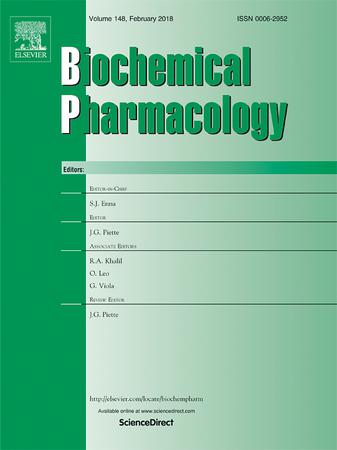Leptin impairs the therapeutic efficacy of adipose-derived mesenchymal stem cells by inducing apoptosis through NLRP3 inflammasomes activation
IF 5.3
2区 医学
Q1 PHARMACOLOGY & PHARMACY
引用次数: 0
Abstract
Mesenchymal stem cells (MSC) have been widely applied for regenerative medicine and the treatment of immune-disorders due to their multilineage differentiation and potent immunomodulatory properties. The therapeutic application of MSC post transplantation are influenced by various endogenous modulators. Leptin, a hormone primarily derived from adipose tissue, exerts a variety of physiological functions, in addition to the metabolic effects. In this study, we examined the effects of leptin on the viability of adipose-derived mesenchymal stem cells (ADSC) and its underlying molecular mechanisms with a particular focus on NLRP3 inflammasomes, which serve as signaling platform of the innate immune system. Leptin significantly decreased the viability of ADSC and induced apoptosis. Mechanistically, NLRP3 inflammasomes signaling critically contributes to leptin-induced apoptosis of ADSC by upregulating p53 and Puma. In addition, NLRP3 inflammasomes activation by leptin is mediated via ER stress induction and ROS accumulation. Finally, suppression of ADSC therapeutic efficacy by leptin and the critical role of NLRP3 inflammasomes in this phenomenon were confirmed in DSS-induced colitis model. Pre-conditioning with leptin before transplantation impaired the therapeutic efficacy and immunomodulatory function of ADSC, which were restored by treatment with a pharmacological inhibitor of NLRP3 inflammasomes. Taken together, the results suggest that leptin induces apoptotic cell death in ADSC and impairs the therapeutic effectiveness of ADSC by activating NLRP3 inflammasomes.

求助全文
约1分钟内获得全文
求助全文
来源期刊

Biochemical pharmacology
医学-药学
CiteScore
10.30
自引率
1.70%
发文量
420
审稿时长
17 days
期刊介绍:
Biochemical Pharmacology publishes original research findings, Commentaries and review articles related to the elucidation of cellular and tissue function(s) at the biochemical and molecular levels, the modification of cellular phenotype(s) by genetic, transcriptional/translational or drug/compound-induced modifications, as well as the pharmacodynamics and pharmacokinetics of xenobiotics and drugs, the latter including both small molecules and biologics.
The journal''s target audience includes scientists engaged in the identification and study of the mechanisms of action of xenobiotics, biologics and drugs and in the drug discovery and development process.
All areas of cellular biology and cellular, tissue/organ and whole animal pharmacology fall within the scope of the journal. Drug classes covered include anti-infectives, anti-inflammatory agents, chemotherapeutics, cardiovascular, endocrinological, immunological, metabolic, neurological and psychiatric drugs, as well as research on drug metabolism and kinetics. While medicinal chemistry is a topic of complimentary interest, manuscripts in this area must contain sufficient biological data to characterize pharmacologically the compounds reported. Submissions describing work focused predominately on chemical synthesis and molecular modeling will not be considered for review.
While particular emphasis is placed on reporting the results of molecular and biochemical studies, research involving the use of tissue and animal models of human pathophysiology and toxicology is of interest to the extent that it helps define drug mechanisms of action, safety and efficacy.
 求助内容:
求助内容: 应助结果提醒方式:
应助结果提醒方式:


